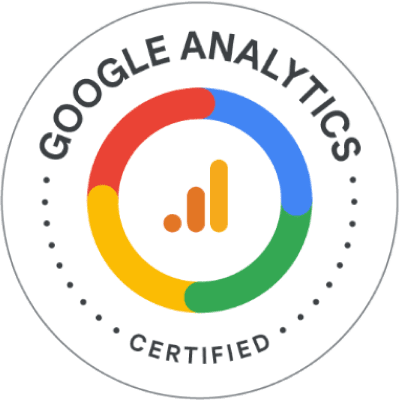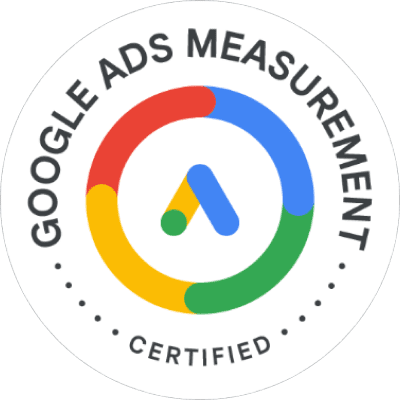The key to generating leads for your business is to be visible when customers are searching for information. That’s where search engine optimisation (SEO) for lead generation comes into play. Whether you’re selling to individuals or B2B, your business needs to be seen by potential customers at every stage of their buying journey.
In this article, I’ll explain how SEO helps your site show up more in search engine results when your audience is looking for your products and services. I’ll also discuss strategies that can help your website generate leads and support your sales team.
What’s the impact of SEO lead generation on small businesses?
Almost 60% of shoppers use Google to look up products before making a purchase. B2B buyers are doing the same—they spend about 27% of their time researching online and only 5% to 6% of their time meeting with a single vendor.
SEO is the process of adjusting your website so it shows up in the search engine results pages (SERPs) and attracts your target audience. The steps in SEO lead generation include:
- Boosting your site’s position in search results for keywords your audience uses
- Creating helpful content to attract visitors to your site
- Offering a great user experience to keep qualified leads interested and guide them into your marketing funnel
- Using strong calls to action like free trials, demos, or newsletter sign-ups to gather contact information and support your sales efforts.
8 Ways to Leverage SEO for Lead Generation
To use SEO lead generation to your advantage, you need to optimise your site according to SEO best practices, add content that interests your audience, and structure your site in such a way that both search engines and visitors can understand it.
Here are 8 SEO lead generation tips to attract potential buyers to your site and help build leads for your sales team.
1. Start with a site audit
To help your business grow with SEO, start by making sure your website is working well. Begin with a thorough site audit to check its overall SEO health. There are over 200 factors that Google uses to rank sites—meet more of these factors to improve your site’s position in search results.
Google keeps its exact ranking factors hidden, so an SEO audit looks at industry best practices for your site’s technical health, user experience, content quality, on-page SEO like page titles and descriptions, and off-page SEO like backlinks.
It might seem overwhelming, but audits help you make a plan. You can focus on key improvements, such as page speed and site errors. Even the best content won’t help if your site is slow, has broken links, or is not secure.
2. Find relevant keywords with keyword research
To get leads with SEO, you need to focus on the search terms your customers use on Google and the information they’re looking for (read “search intent”).
Use detailed buyer personas to understand their needs and create a list of keywords they might use at different stages of their buying journey. A keyword research tool can help you expand this list, find related keywords you might not have thought of, and see which keywords your competitors are using.
Then, choose which keywords to focus on based on:
- Relevance: How important the keyword is to your audience and business
- Search volume: How often people search for the keyword
- Keyword difficulty: How hard it is to rank on the first page of search results for the keyword
Keywords and Search Intent
the best SEO lead generation strategy is reaching buyers at every stage of their journey:
- Awareness Stage: When they are just starting to research their problem.
- Consideration Stage: When they are figuring out which product can solve their problem.
- Conversion Stage: When they are ready to decide where to buy.
Good SEO lead generation means understanding the search intent, which is the reason someone uses a keyword. You can then create content that answers their question.
There are four main types of search intent:
- Informational: The user wants to find an answer to a question, like “When should my baby start solid food?”
- Navigational: The user is looking for a specific website or page and uses a search engine instead of typing the entire URL.
- Commercial: The user is considering options to decide. Keywords might include words like “best,” “compare,” “versus,” and “reviews.”
- Transactional: The user is ready to buy and is deciding where to purchase. Keywords might include brand names, products, or phrases like “trial,” “free consultation,” “near me,” “where to buy,” “affordable,” “promo code,” or “reserve.” These vary by niche.
If you’re focusing on customers who are ready to buy (bottom-of-the-funnel), use high-intent keywords so your webpage appears when they are closer to making a purchase.
3. Publish great content on your blog
After finding the keywords your target customers are using, create useful and informative content to attract them to your website. There’s a lot of competition on SERPs, so to generate leads with SEO, you need to post high-quality content that is useful and valuable to readers.
The better your content matches your target audience’s needs, the more likely you are to meet their expectations. When creating content, think about who you’re trying to reach and make sure it matches what they’re looking for. For example, someone using broad, informational search terms isn’t ready to read testimonials or case studies. Create content briefs to help your writers follow the plan.
Use effective CTAs that match the stage of the buyer’s journey to collect information for your sales team. Free trials, free consultations, downloadables, and white papers are effective SEO lead generation machines.
To keep your blog consistent and effective, it’s helpful to follow a framework:
- Plan your content ahead: Use an editorial calendar to manage topics, consider seasonal trends, and post regularly to keep your site fresh.
- Follow an SEO checklist: Use best practices for headers, page titles, descriptions, keyword placement, and formatting to improve search visibility and make your content easy to read.
- Link strategically: Think about what your reader might want to know next and guide them to other relevant content on your website.
- Refresh content regularly: Update and optimize existing content on a routine basis.
4. Use local SEO
If your business wants to attract customers in a specific area, you need local SEO strategies to show up in search results. People often search online to find nearby locations, check business hours, and read reviews.
Here’s how to improve your local SEO:
- Claim Your Google Business Profile: Make sure your business name, address, and phone number (NAP) are correct so you can appear in Google Maps and local search results.
- Optimise Your Business Profile: Add high-quality images, videos, FAQs, product descriptions, and updates to give customers as much information as possible directly on the search results page.
- Use Geographic Keywords: Include location-based keywords like “SEO agency in London” in your website content, title tags, meta descriptions, and headers. You can also create pages specific to different locations.
- Encourage reviews: Provide excellent service and ask customers to leave reviews. Respond quickly to any negative reviews.
- List in online directories: Add your business to online directories to build local citations. Partner with other small businesses for link exchanges or guest posts and consider sponsoring community events for extra online exposure.
5. Create a link building strategy
Building backlinks is a key part of SEO for lead generation since links from trusted websites can boost your search ranking.
Here’s how it works: When other websites link to your content, Google sees this as a sign that your content is trustworthy, making it more likely to rank your page higher in search results. The more quality links you have from respected sources, the better. Google also values links from a variety of different websites, so try to get backlinks from various sources.
Link building is an integral part of SEO lead generation. Here are some methods:
- Guest Posts: Write content for reputable websites that have a similar audience. You can usually include a link back to your site, which can function as an effective SEO for lead generation strategy.
- Broken Link Building: The web is full of broken links to pages that no longer exist. Offer your website as a replacement for those links. Top-rated SEO agencies, like Hawk SEO, can help with this on a larger scale.
- Resource Link Building: Find important online resource pages related to your field and ask the website owner to include your content as useful information for their audience.
6. Optimise your site speed
Studies show that a slow website usually drivess visitors away, making them less likely to become leads. For example, if the load time goes from one second to three seconds, users are about one-third more likely to bounce.
To avoid hurting the efforts of your SEO for lead generation, improve your site speed by:
- Compressing and optimising images
- Minimising HTML, CSS, and JavaScript files
- Removing unnecessary page redirects
- Deleting unnecessary plugins
- Using content delivery networks (CDNs)
- Delaying the loading of images not immediately visible, like those that require scrolling.
Since site speed affects your search ranking, use Google’s Page Speed Insights tool to check your site’s performance. This tool will identify issues that are slowing down your site and suggest fixes.
7. Grow your social media presence
To strengthen your SEO for lead generation, build a social media strategy on platforms where your target audience spends time. With a social media campaign, you can:
- Market directly to your followers and encourage them to visit your website
- Show up in search results with links to your social media profiles when people search for your brand
- Help people find your brand on social platforms by using hashtags
- Get more leads to your website and guide them into your marketing funnel
- Spread your content further and increase brand awareness when users like, share, or comment on your posts
- Increase the chances of getting backlinks as users find your content and mention it in their own blog posts
8. Measure Your Progress
Track performance for maxmised SEO lead generation efforts. This will help you filter out effective strategies from lesser ones. Before you start, pick metrics that match your goals to measure your progress effectively.
Here are some key metrics to track:
- Keyword Rankings: Check how your keywords are ranking in search results. If you’re not seeing improvement, especially for important keywords, you might need to adjust your strategy, focusing on technical SEO, content quality, or backlinks.
- Click-Through Rate (CTR): This measures how many people click on your site after seeing it in search results. A low CTR might mean your page title, description, or content isn’t compelling enough. You could try adding structured data like star ratings or images to make your listing stand out.
- User Engagement: Monitor how long visitors stay on your site and how they interact with your content. This tells you if you’re reaching the right audience and providing a good user experience.
- Conversions: Conversions are actions like signups, free trials, downloads, bookings, and sales. Track relevant conversions helps you see how well your content is convincing visitors to take the next step.
- Return on Investment (ROI): Track ROI to compare the revenue generated from your SEO lead generation efforts to the amount spent. This shows how effectively you’re using your SEO budget.
Start Generating More Leads With SEO Today
If you don’t have a Custom SEO lead generation strategy, you’re missing out on finding new leads and increasing your business revenue. An expert SEO agency can help you develop a strategy based on data that aligns with your goals. If you’re ready to begin, contact our team at Hawk SEO for a free consultation.







